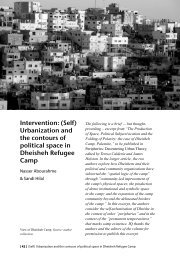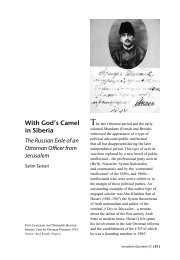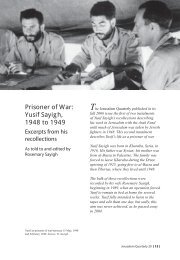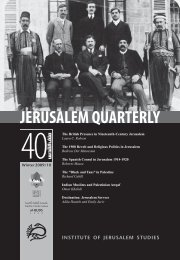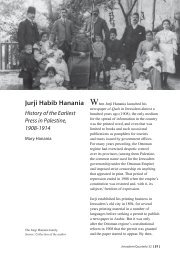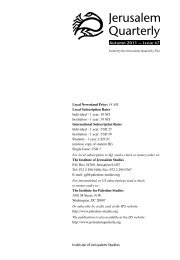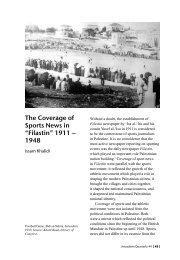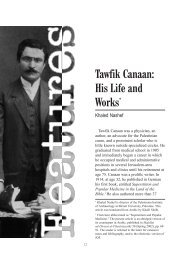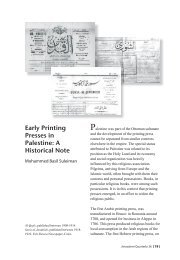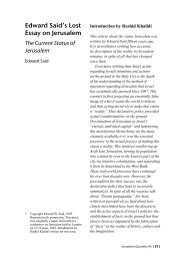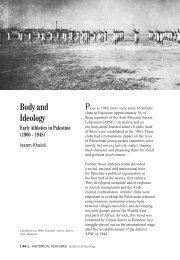Film Documentary Review - Institute for Palestine Studies
Film Documentary Review - Institute for Palestine Studies
Film Documentary Review - Institute for Palestine Studies
Create successful ePaper yourself
Turn your PDF publications into a flip-book with our unique Google optimized e-Paper software.
<strong>Film</strong> <strong>Documentary</strong> <strong>Review</strong><br />
Lord Ashdown’s ‘The Battle <strong>for</strong> the Holy Land:<br />
Jerusalem’ – the View of a Soldier, Diplomat, Politician<br />
and Spy<br />
Craig Larkin<br />
In 2007, Lord Ashdown complied an investigative documentary <strong>for</strong> Channel 4,<br />
‘The Battle <strong>for</strong> the Holy Land: Jerusalem’ exploring and analysing the historical,<br />
religious and political claims to the sacred city and possibilities <strong>for</strong> Jerusalem’s future<br />
status. This two hour, six-part documentary, shot over a period of four months in<br />
Jerusalem uniquely captures, the intractable issues, yet also the real life stories of<br />
pain, suffering and social division. Ashdown, a <strong>for</strong>mer Royal marine (Persian Gulf<br />
and Far East), British politician (leader of the Liberal Democratic Party, 1988-1999)<br />
and International diplomat (European Security Conference) is well placed to offer<br />
pragmatic and strategic insight into Jerusalem’s enduring conflict. Drawing on his<br />
military experience of sectarian violence on the streets of Belfast and his political<br />
post of High Representative <strong>for</strong> Bosnia and Herzegovina (2002-2006) overseeing a<br />
fragile post-war reconstruction, he presents both valuable comparative analysis and<br />
feasible ‘on the ground’ interventions <strong>for</strong> Jerusalem’s divided city. In The Battle <strong>for</strong><br />
the Holy Land, Ashdown admirably tries to engage with and disaggregate Palestinian<br />
and Israeli claims and counterclaims, in an attempt to find practical steps that will<br />
help facilitate a process of peace-building. The result is a balanced, yet hard-hitting<br />
account, which provides human faces to a globalised conflict; probing the underlying<br />
sources of conflict rather than too often reported consequences.<br />
Part one of the documentary begins by framing the conflict around Israel’s<br />
occupation/reunification of East Jerusalem in 1967 and the symbolic capture of<br />
the Jewish Western Wall alongside the fateful destruction of the Arab Mughrabi<br />
Quarter. The second part examines the historic massacres committed by both Jews<br />
and Palestinians at Deir Yassin and Gush Etzion in 1948, and the subsequent legacy<br />
of antipathy and mistrust. Part three explores the Israeli governments’ systematic<br />
attempt to sustain a Jewish majority in Jerusalem through Palestinian house<br />
demolitions, unequal provision of public services and physical exclusion due to the<br />
construction of the separation wall. The fourth section explores the tensions within<br />
the Arab Christian community, particularly concerning the Greek Orthodox sale<br />
of land and pilgrim access to the Church of the Holy Sepulchre. Part five focuses<br />
exclusively on the disputes, violence and controversy concerning the Temple Mount/<br />
Haram al-Sharif compound. The final section analyses the recurring tensions, which<br />
Jerusalem Quarterly 39 [ 81 ]
Ashdown summarises as ‘the dialogue of the deaf’, ‘exclusive visions without<br />
inclusive answers’ and ‘racism masquerading as bureaucracy’, be<strong>for</strong>e setting out a<br />
comprehensive strategy <strong>for</strong> Jerusalem’s future. This includes putting Jerusalem first<br />
in any broader agreement; the acceptance of a ‘shared history and a shared city’;<br />
status quo arrangements that cover all the holy places; a charter of rights <strong>for</strong> all of<br />
Jerusalem’s citizens and ‘an end to the wall and the terror that created it.’<br />
The power of this investigative piece does not merely lie with its clear yet rather<br />
vague conclusions, but in the fascinating extensive interviews and illuminating<br />
snapshots of everyday Jerusalem experiences. Ashdown doesn’t shy away from<br />
awkward questions but seems to relish challenging both sides of the conflict –<br />
whether it be probing Israeli officials over tunnels under the Haram; Greek Orthodox<br />
Patriarchs over land sales and corruption; Al-Waqf staff concerning their inability to<br />
dialogue with Israelis; Israeli settlers and Islamist leaders on their exclusive visions<br />
of Jerusalem; and Palestinian and Israeli politicians and activists on their inability to<br />
recognise alternate historical perspectives. These rigorous discussions are balanced<br />
with sensitive and emotive personal stories of Palestinians who have lost homes,<br />
Israeli parents who have lost children in suicide attacks; and those suffering due<br />
to house demolition orders, road blocks and expropriation of land. The result is a<br />
complex and dynamic account of Jerusalem’s multifaceted friction points.<br />
Despite the documentary’s breadth of analysis, wide ranging interviews and<br />
coverage of the major themes, it seems to have overlooked completely the issue<br />
of Palestinian sovereignty and statehood. Ashdown’s valuable principles clearly<br />
are envisioned within a shared and open city (under Israeli control) but they fail to<br />
address the controversies over municipal borders, land ownership, Israeli settlements<br />
and security. Also while Ashdown makes compelling arguments concerning the<br />
establishment of a unified religious body to regulate and manage access of Jerusalem’s<br />
Holy Sites (copying the Status quo arrangements of the ‘Church of the Holy<br />
Sepulchre’) he provides little detail or discussion as to how this could practically<br />
work. Similarly the charter <strong>for</strong> equal rights <strong>for</strong> Jews and Palestinians, tends to ignore<br />
the wider implications of citizenship and legal jurisdiction; would this be en<strong>for</strong>ceable<br />
in Israeli courts or under a system of joint sovereignty<br />
These unresolved questions, do not detract from an insightful and timely<br />
investigation, of a city which remains a ‘pressure cooker’ <strong>for</strong> volatile religious<br />
imaginings, nationalist aspirations and real urban struggles. Ashdown’s conclusions<br />
if anything emphasize the need <strong>for</strong> greater regional co-ordination and international<br />
pressure and diplomacy to facilitate an agreement on Jerusalem as part of a wider<br />
Arab-Israeli peace initiative.<br />
[ 82 ] <strong>Film</strong> <strong>Documentary</strong> <strong>Review</strong>



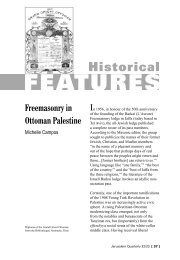
![In Search of Jerusalem Airport [pdf] - Jerusalem Quarterly](https://img.yumpu.com/49007736/1/180x260/in-search-of-jerusalem-airport-pdf-jerusalem-quarterly.jpg?quality=85)
